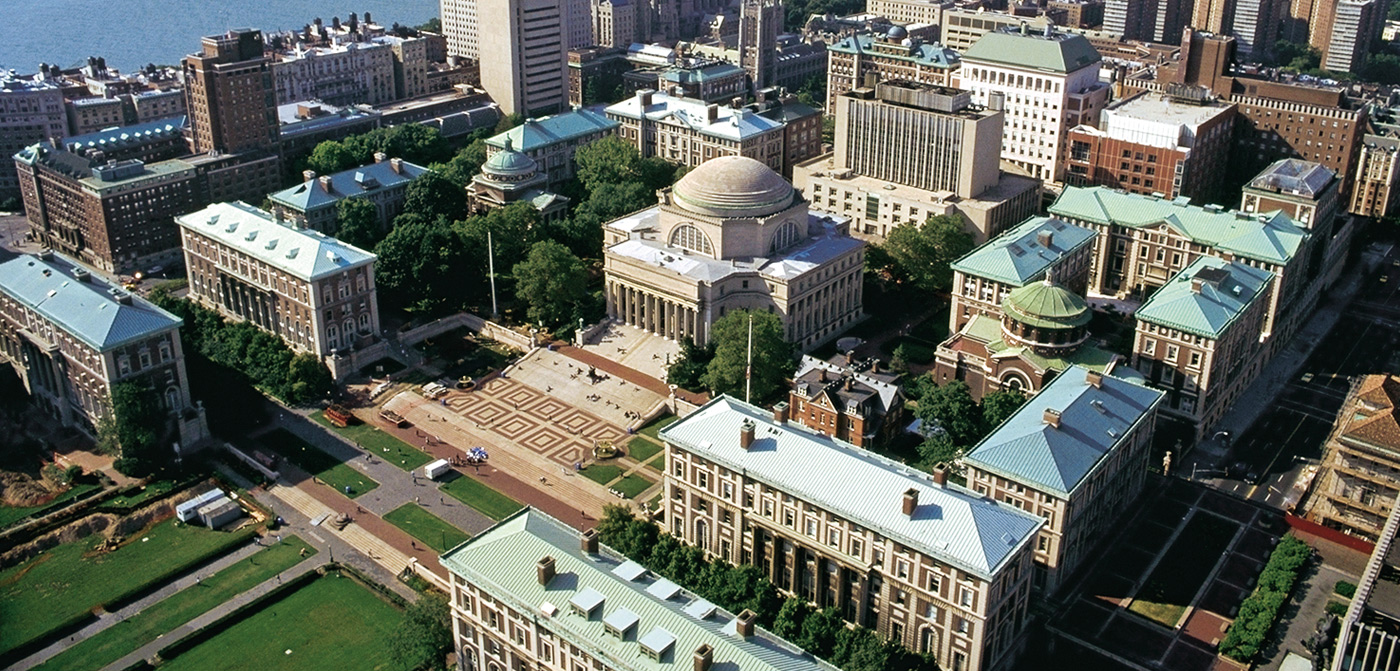
A Stronger Morningside
Perhaps three stories describe the physical assets of Columbia's historic Morningside Heights campus, home to the majority of Columbia’s acclaimed undergraduate, graduate and professional schools as well as University housing.
One is of classic architecture and picturesque landscaping – a traditional campus within a city – designed along Beaux-Arts principles by prominent architects McKim, Mead and White.
The second tells a less rosy but undoubtedly realistic story about aging infrastructure and century-old buildings tasked with supporting the 21st century demands of a university striving to lead with the best in the world.
Third is the story of Facilities and Operations, respecting the campus's history while making changes to meet the needs of world-class researchers; paying homage to the natural beauty of the historic grounds and buildings while believing that upgrading the campus's infrastructure to the most advanced systems is not only possible but necessary.
It is the third story that best represents what takes place at the Morningside campus, year-in and year-out, and Fiscal Year 2016 was no exception, as Facilities and Operations, working with our University partners and clients, completed $140 million in construction and renovation at Morningside, spanning 400 projects that enhanced spaces where students, faculty and staff can thrive and learn.
Fiscal Year 2016 Capital Project Highlights
"When I think of a quintessential capital project at Columbia, it's one where exterior preservation work and interior modernization has the effect of transporting someone from the 19th century to the 21st century by moving through a building's front door," said Edward McArthur, vice president of Planning and Capital Project Management. "There are many recent projects that fit this model: the Pupin exterior, MEP vertical infrastructure and Physics Department Theory Center; the Brown Institute at Pulitzer Hall; the Data Science Institute in Mudd and many more."
FY16 brought a mix of brand-new spaces with the more common renovation within historic buildings. Completion of the top “Beacon” floor of the Northwest Corner Building provides new office, student and meeting space with sweeping city views for the Data Science Institute. A new home for the Institute for Israel and Jewish Studies in Kent Hall has room for public events, visiting speakers and scholarly conferences. Renovation and redesign of the Café 212 space in Lerner Hall includes new furniture and lounge seating, customized millwork and a striking digital wall featuring 196 countries that represent our global community. Also in Lerner, the fifth floor Counseling and Psychological Services space underwent a renovation to create a single, contiguous suite including a reception area and 10 private offices.
Improvements at Columbia Law School’s Jerome Greene Hall included a reimagined lobby and a full-room redesign and complete audio-visual technology upgrade of the popular Case Lounge. A refresh of the fifth floor lounge in Mathematics features an attractively designed pantry, new furniture and a multi-panel, composite chalkboard; many celebrated features of the finishes remain, such as the large “tea table” and the classic slate chalkboard. New single-use restrooms throughout campus and the creation of a Morningside campus gender neutral restrooms map increases the number of and access to inclusive restrooms.
As always, preserving the historic character of the campus and surrounding community is an important component of these and of all Facilities projects; $9.9 million of exterior and historic preservation projects were completed this fiscal year, helping improve Columbia’s sense of place on campus and in the Morningside Heights community.
And not to be overlooked is the multi-year chiller expansion and boiler retrofit at the Morningside campus central energy plant. New, ultra-efficient chillers in the university's central chilled water plant produce chilled water up to 30 percent more efficiently and create flexibility in energy sources for services, reducing the consumption of fossil fuels, greenhouse gas emissions and energy costs. A retrofit of 30-year-old boilers at the Central Steam Plant increase efficiency, reduce emissions and save energy.
A Stronger Columbia
These and other enhancements are part of an overall ongoing investment in new and renovated facilities throughout the University, including award-winning buildings such as the newly constructed Northwest Corner science building which completes the core Morningside campus, Campbell Sports Center at the Baker Athletics Complex, and Gary C. Comer Geochemistry Building at the Lamont-Doherty Earth Observatory. Significant renovations include Knox Hall on 122nd Street, the Columbia Alumni Center on West 113th Street and Faculty House.
In total, over the past decade, Facilities and Operations has delivered $3.3 billion in construction and renovation projects. In addition, this past year $65.8 million was spent towards our annual State of Good Repair (SOGR) program, for a decade total of $703.5 million dedicated to upgrading core campus infrastructure in both our academic and residential portfolios.
A Sustainable Future
When existing buildings are renovated, or new ones are constructed, Facilities and Operations is committed to incorporating sustainable elements and obtaining LEED (Leadership in Energy and Environmental Design) certification, the nationally accepted benchmark for design, construction, and operation of high-performance, green buildings.
There is much more to come. As the new Manhattanville campus continues to take shape, and with 105 new space planning efforts across our campuses this fiscal year alone, the University will be able to repurpose freed space at Morningside, helping to address space needs with facilities that will further strengthen Columbia’s reputation as one of the world’s great universities.

